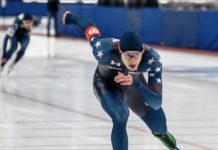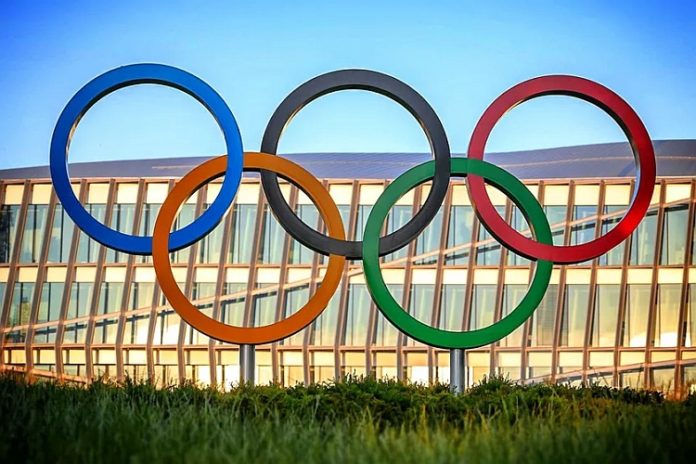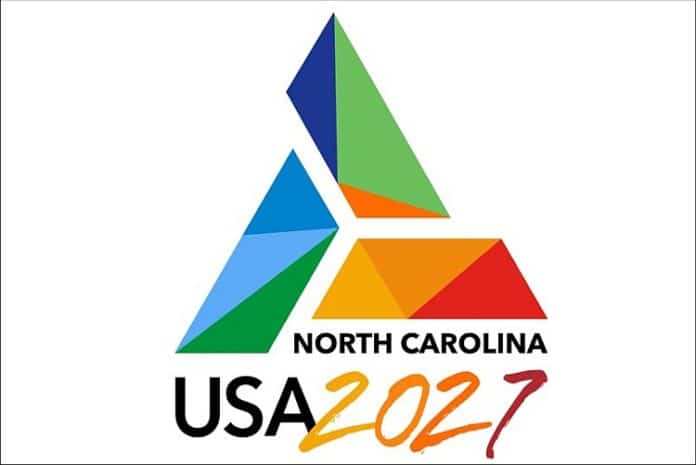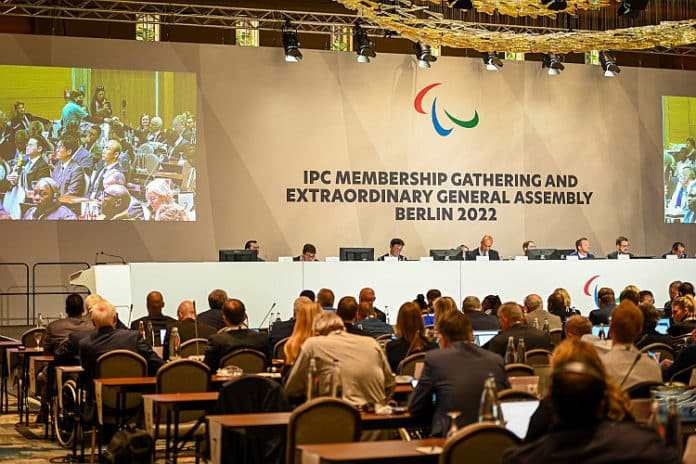★ The Sports Examiner: Surveying, monitoring and explaining the key competitive, economic and political forces shaping elite sport and the Olympic Movement. ★
★ Want TheSportsExaminer.com insights for your team? Yes! Click here for info on speaking, research and consulting from editor Rich Perelman. ★
★ To get The Sports Examiner by e-mail: sign up here! ★
≡ THE 5-RING CIRCUS ≡
1. Payne on sports and the Olympic Games: no sport is safe
2. FIFA President asks G-20 for a FIFA World Cup truce
3. Valieva is innocent of doping, say Russian coaches and officials
4. Duplantis, Lyles finalists for T&F men’s Athlete of the Year
5. FIG in good financial standing thanks to IOC’s Tokyo contribution
Former International Olympic Committee marketing director Michael Payne made some interesting comments during last weekend’s Union Internationale de Pentathlon Moderne Congress, notably that “no sport is safe” on the Olympic program and that even equestrian’s place could be re-evaluated. FIFA President Gianni Infantino addressed the G-20 Summit in Indonesia and suggested a “World Cup Truce” during the tournament beginning on Sunday as a step toward peace. IOC President Thomas Bach also spoke and asked for governments not to dictate which athletes from which countries could compete where. Russian officials declared that star skater Kamila Valieva must be innocent of doping as the World Anti-Doping Agency removed the case to the Court of Arbitration for Sport. World Athletics announced its five men’s Athlete of the Year finalists, including American sprint star Noah Lyles. At its 84th Congress, the International Gymnastics Federation released its 2021 financial report, showing a big increase in revenue and reserves thanks to the IOC’s Olympic television rights share, but also underscoring the federation’s dependence on Olympic funding to stay afloat.
1.
Payne on sports and the Olympic Games: no sport is safe
Former long-time International Olympic Committee marketing director Michael Payne (IRL) provided some fascinating remarks at last weekend’s Union Internationale de Pentathlon Moderne (UIPM) Congress, which eventually voted in favor of admitting obstacle-course racing as a possible discipline, with the idea to offer it as part of a new format to try and get into the 2028 Olympic Games in Los Angeles.
But a portion of his comments went far beyond the specific circumstances of the modern pentathlon, and more to the situation for all sports seeking entry (or re-entry) to the Games:
“No sport is safe on the programme. Look at what has happened to Boxing and Weightlifting. And it is far from certain that these sports will make it back on the programme for LA28.
“Baseball and Softball are also struggling to get back on. Wrestling was dropped and only through a major overhaul did they succeed in getting back on.
“I would not be surprised if behind closed doors clear messages are not also being given to the FEI [equestrian].”
That view is certainly not universally shared, but Payne’s comments – given his experience and contacts – must be considered. As for pentathlon, he was part of an advisory group that pushed the UIPM for a change away from riding:
● “[T]o be perfectly honest, I am amazed that you are still on the programme.
“I have watched how over the last three decades; your sport has been repeatedly threatened with being dropped from the Olympics.
“You have dodged death multiple times. Some of you either cannot or refuse to understand what is at stake here today. No amount of lobbying or tinkering with the riding format will save you.
“Let me be very clear, once you have been dropped from the Olympic programme, it is game over: There will be no way back – and your sport will struggle to even survive without the Olympics.
“As I noted, when I was approached and asked if there was anything I thought could be done to save your sport, my initial reaction was ‘I doubt it.’
“I knew of the split in your ranks about riding, and it was my impression that a house divided cannot stand. I have watched with dismay, frankly with utter disbelief as certain groups try to defend their equestrian interests; how the debate has been highjacked for various political agendas. Is 30 years too long for an individual to be president – maybe, but for Christ’s sake that is tomorrow’s problem, not today’s.”
● “The IOC rarely says things directly – it is always couched in diplomatic language, and you have to read between the lines.
“The IOC does its best to respect the independence of each IF, and publicly only gives guidance, subtle hints.
“But privately the leadership of the IOC has been very clear – and more recently in public; riding must go.”
● “The IOC and LA28 need to understand where Modern Pentathlon and UIPM family stands on sincere, genuine change.
“At the moment, they don’t think you will be able to get your act together and they will just move on without Modern Pentathlon.”
The UIPM voted for the change that Payne supports, but the athletes group PentUnited was hardly impressed, tweeting during the Congress:
“The General Assembly have voted against the will of the athletes who have desperately battled bravely to defend their sport #savepentathlon”
Observed: Payne’s comments will certainly be an eye-opener for the equestrian crowd, which has been repeatedly praised by current IOC chief Thomas Bach (GER), including at the recent World Eventing Championships in Italy in September, saying “I’m very impressed by the many measures the FEI has taken to safeguard the wellbeing and the health of the horses, and I am pleased with everything the International Federation is doing to ensure the future of the sport.”
As for sports moving on and off the Olympic program, Payne is much more right than wrong, but there have been – and will continue to be – exceptions. The size of the Games was increased regularly after World War II, with host cities adding new sports as medal or demonstration events. And some sports have returned after being dropped, including:
● Archery, held in 1972 after having been out since 1920;
● Canoe Slalom, at Munich ‘72 but not again until Barcelona 1992;
● Tennis, held at Paris 1924, but not again until Seoul 1988;
● Baseball, held from 1992-2008 and again in 2020;
● Softball, held from 1996-2008, and in 2020.
And with the IOC’s current format, it’s likely that other sports may come and go. But Payne makes the point that it’s not easy to get onto the program and for those sports which are not highlighted at the Games, it’s easy to see them dropped.
And as for baseball (and softball), the LA28 organizers are keenly aware that the Dodgers and Angels drew a combined 6.3 million fans in 2022 alone, and that both Dodger Stadium and Angel Stadium have been filled when hosting the World Baseball Classic. Those are good indicators that those sports will be prime candidates as additions to the 2028 program.
2.
FIFA President asks G-20 for a FIFA World Cup truce
FIFA President Gianni Infantino (SUI) addressed the G-20 Summit in Bali, Indonesia on Tuesday and asked for a truce during the FIFA World Cup that starts on Sunday. Highlights:
● “Qatar has made significant reforms over the last two years, also thanks to the World Cup. As a consequence of that, for example, hundreds of thousands of workers enjoy better conditions than some years ago. So, three million fans will fill the stadiums and five billion people – five billion people – more than half the world’s population will watch the games on TV.”
● “We know that our main focus as a sports organisation is and should be sports. But because football unites the world, this particular World Cup, with five billion people watching it, can be the trigger for a positive gesture, for a sign or a message of hope.
“Dear leaders, Russia hosted the last World Cup in 2018. Ukraine [with Portugal and Spain] are bidding to host the World Cup in 2030 [among others]. Maybe, maybe, maybe that the current World Cup starting in five days can really be that positive trigger. So my plea to all of you is to think on a temporary ceasefire – for one month, for the duration of the World Cup – or at least the implementation of some humanitarian corridors or anything that could lead to the resumption of dialogue as a first step to peace. You are the world leaders, you have the ability to influence the course of history.”
Infantino also had special commemorative World Cup 2022 soccer balls made with the name of each national leader at the meeting, and asked:
“If you don’t mind, I would like to ask everyone to sign maybe this particular ball, and then together with [Indonesian] President [Joko] Widodo, we can decide what we do with it.”
International Olympic Committee President Bach also addressed the forum, and once again asked for governments to stay out of sport:
“[I]n contrast to the far too many other wars and conflicts in our world, regarding this war some governments started to decide which athletes would be allowed to participate in international sports competitions – and which not.
“They did and they do so purely on political grounds, They want to decide which athletes can now qualify and finally compete at the Olympic Games Paris 2024. If sport becomes – in this way – just another tool to achieve political goals, international sport will fall apart …
“Olympic sport needs the participation of all athletes who accept the rules, even and especially if their countries are in confrontation or at war. A competition between athletes from only like-minded states is not a credible symbol of peace.”
3.
Valieva is innocent of doping, say Russian coaches and officials
“We cannot give any comments on this issue, since the federation is not a party to the process. But we do not doubt the innocence of Kamila Valieva.”
That’s from Russian Figure Skating Federation President Alexander Gorshkov on Monday, following the filing by the World Anti-Doping Agency at the Court of Arbitration for Sport against the Russian Anti-Doping Agency and figure skating star Valieva. The skater had a positive doping test on 25 December 2021, but the result was not communicated until after she had participated with the winning Russian team in the figure skating Team Event at the 2022 Beijing Olympic Winter Games.
WADA is asking for a four-year ban and a nullification of her results since the date of her test in 2021; that would disqualify the Russians in the Team Event and promote the U.S., Japan and Canada to the gold, silver and bronze medals.
But Russian officials are having none of it. Legendary skating coach Tatyana Tarasova, now 75, told the Sport Express site:
“I think it’s a rare outrage. Is it possible that she could actually be disqualified for that length of time? I don’t know, it looks like anything is possible, just to ruin a girl’s life. They are guided by the fact that there was a violation, but I can’t imagine that there was a violation.”
And the head of the Sambo-70 club at which Valieva trains, Renat Laishev, told the Russian news agency TASS:
“Valieva will be even more hardened after all this history. We have to support Valieva so that she continues to train, to please us with her art.”
For its part, the International Skating Union – which must, in the end, certify the final results of the Team Event from Beijing – is waiting:
“The ISU has taken note of WADA’s appeal to CAS and continues to closely monitor the outcome process of this case. The Union will take action in due course.”
4.
Duplantis, Lyles finalists for T&F men’s Athlete of the Year
World Athletics announced its five finalists for its men’s Athlete of the Year, including World 200 m Champion Noah Lyles of the U.S. The final five:
● Mondo Duplantis (SWE): World Indoor and Outdoor Champion; world record of 6.21 m (20-4 1/2);
● Soufiane El Bakkali (MAR): World Steeplechase Champion and world leader at 7:58.28;
● Jakob Ingebrigtsen (NOR): World 5,000 m Champion and 1,500 m silver medalist; world 1,500 m leader at 3:29.02;
● Eliud Kipchoge (KEN): Won Tokyo and Berlin Marathons, and lowered his own world record to 2:01:09;
● Lyles (USA): World 200 m Champion in 19.31, making him the third-fastest all-time.
The finalists were derived mostly by the choices by the World Athletics Council (50%), with input from the World Athletics Family (national federations and others: 25%) and fans (265%, cast 1.3 million votes). The winner will be announced in December.
5.
FIG in good financial standing thanks to IOC’s Tokyo contribution
The Federation Internationale de Gymnastique (FIG) held its 84th Congress in Istanbul (TUR) on 11-12 November, with several countries refusing to participate due to the presence of Russian and Belarusian officials who were allowed to participate.
But the Congress went on, with amendments to the governing statutes to deal with future wars, described as:
“Detailed definitions concerning ‘extraordinary events’, as well as clear and exhaustive provisions regarding protective measures that may be taken should such extraordinary events occur.”
The FIG financial report was presented for 2021, with the balance sheet substantially improved by the $31.36 million payment by the International Olympic Committee as the gymnastics share of the sale of Olympic television rights.
The FIG showed CHF 72.9 million in assets, up from CHF 44.5 million at the end of 2020 and reserves of CHF 35.6 million, up from CHF 25.4 million a year before. (CHF 1 = $1.06 U.S.)
Thanks to the IOC’s television money, FIG’s operating income for 2021 jumped to CHF 10.6 million vs. a loss in 2020 of CHF 7.2 million. The projections for 2022-24 show operating income of only CHF 13.8 million for 2022, CHF 13.0 million for 2023 and CHF 10.0 million in 2024. Reserves are expected to fall to CHF 26.3 million by the end of 2024.
Observed: Despite being one of the three Tier A sports in terms of Olympic television revenue receipts – along with Athletics and Aquatics – gymnastics very much appears to be yet another federation mostly dependent for its survival on the IOC. That is sad.
≡ PANORAMA ≡
● Olympic Winter Games 2026: Milan Cortina ● The Associated Press reported that the Trentino regional government approved a €50 million project (about $51.7 million U.S.) to add a roof to the outdoor Baselga di Pine skating venue, slated to be used for the 2026 Winter Games.
The Milan Cortina 2026 organizing committee noted that it had nothing to do with the project, which is designed for long-term use of the facility by the region. However, it will be the beneficiary of an enclosed rink, strongly preferred for ice control by speed skaters.
● Football ● As Sunday’s start of the FIFA World Cup gets closer, many of the in-stadium details are now available and FIFA and the Qatar organizers have published a well-done, 76-page Fan Guide, available for download now.
It’s really for people on-site, with maps of each of the eight stadiums, how to get around, how to get in and where the fan festivals and other attractions are. Producers of any event will find it informative and a model for the future.
¶
Another World Cup guide – sort of – was issued earlier in the month by Human Rights Watch, titled Human Rights Reporters’ Guide for 2022 FIFA World Cup Qatar.
Across 50 pages, it details the organization’s negative view of abuses in working conditions in Qatar, deaths during the construction period, the role of FIFA, discrimination against women and same-sex relationships in Qatar, and its recommendations, including calls – not so far answered – for either Qatar or FIFA or both to contribute money equal to the $440 million in team prize payments to remedy abuses caused and for reparations.
¶
The U.S. Women’s National Team may have gone into its friendly with no. 3 Germany on 10 November needing a win after two straight defeats, but the game in Ft. Lauderdale did not get much interest from viewers.
Shown on FS1, Nielsen reported the game drew 323,000 viewers in a 7 p.m. Eastern time slot. One hour later, the Thursday night NFL game – Atlanta at Carolina – shown only on Amazon’s streaming service, drew 6.8 million viewers.
¶
U.S. women keeper Ashlyn Harris, 37, announced her retirement on 14 November, finishing with 25 appearances and 21 starts and as a member of both the 2015 and 2019 FIFA Women’s World Cup winners. She debuted with the national team in 2013 and last played in goal for the U.S. in 2020; she had nine career shutouts to her credit.
● Gymnastics ● Suni Lee, 19, the Tokyo 2020 Olympic All-Around gold medalist, announced on Twitter that she will complete her sophomore season with the Auburn women’s gymnastics team before leaving to concentrate on making the U.S. team for the Paris 2024 Olympic Games.
“This will be my last season competing at Auburn University. My focus right now is to make it the most incredible season yet and to be the best teammate I can be.
“I am so excited to share that after this season I will be returning to elite gymnastics. I have my sights set on Paris in 2024, and I know what I have to do to get there.”
Lee won the All-Around gold, the Team silver and Uneven Bars bronze in Tokyo, and stepped right in at Auburn, winning an NCAA Championships silver in the All-Around and winning on Beam in 2022.
● Swimming ● American Olympic fans remember Tracy Caulkins as one of the stars of swimming in the 1980s, winning golds at the Los Angeles 1984 Games in the women’s 200 m and 400 m medley and on the 4×100 m medley relay.
She married Australian swimmer Mark Stockwell in 1985 and moved to Australia, where she is a highly-respected sports administrator, including serving on the Swimming Australia Board since 2016. She stepped in as President of the organization when Kieran Perkins moved on to head the Australian Sports Commission in February.
But Stockwell’s term is over after nine months, as Swimming Australia elected Dr. Michelle Gallen, a former elite triathlete, as its new head. She was already a member of the Swimming Australia Board and was serving as Director of Strategic Projects for the Queensland Government’s Department of Tourism, Innovation and Sport.
● Wrestling ● United World Wrestling posted its final 2022 men’s Freestyle rankings, with three Americans ranked at no. 1: Thomas Gilman (57 kg), Jordan Burroughs (79 kg) and Kyle Snyder (97 kg). Both Burroughs and Snyder won world titles this year and Gilman won silver.
Also in the top three were 79 kg World Champion Kyle Dake, ranked second, and 86 kg World Champion David Taylor, ranked third. There were prizes attached to the rankings, with the top three in each weight awarded $5,000-3,000-2,000. The U.S. had 11 wrestlers finish the year ranked in the top 10.
In the women’s Freestyle rankings, Dominique Parrish (63 kg) and Tamyra Mensah-Stock (68 kg) both ranked no. 1, with Sarah Hildebrandt (50 kg), Kayla Miracle (62 kg), and Amit Elor (72 kg) ranked second and Jacarra Winchester (55 kg) and Mallory Velte (65 kg) ranked third.
The U.S. had no top-three rankings in Greco-Roman.
¶
The U.S. Anti-Doping Agency announced Tuesday that two-time U.S. Greco-Roman Olympian Ben Provisor (74 kg and 85 kg) accepted a 16-month suspension for the use of a prohibited drug taken as part of a medication.
Provisor, 32, tested positive for amphetamine in June and although he ingested it as part of a prescribed program from his physician, he had no Therapeutic Use Exemption (TUE) for the prohibited substance, thus the suspension as of 11 July 2022. He will be eligible again in November of 2023, in time for a run at the Paris 2024 Games if he chooses.
¶
You can receive our exclusive TSX Report by e-mail by clicking here. You can also refer a friend by clicking here, and can donate here to keep this site going.
For our updated, 951-event International Sports Calendar for 2022-23 and beyond, by date and by sport, click here!























